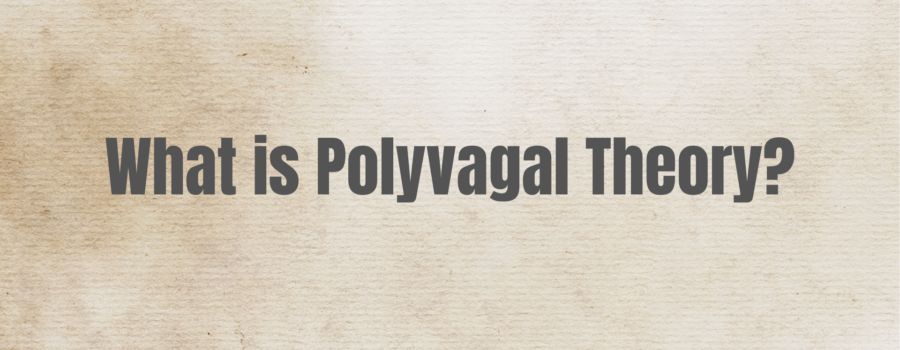Polyvagal Theory is a neurobiological theory presented and coined by Dr. Stephen Porges that explains the connection between the brain, the body, and the psychological capabilities of humans. Translation: Polyvagal theory is the idea that there is no separation between our minds and our bodies. Our nervous system is informing how our brains function and how we feel, and vice versa. Seth Porges, son of Stephen Porges, explains Polyvagal Theory as “how we feel safe.”
So let’s get into the science for a minute, but bear with me: I am no neuroscientist.

Your vagus nerve is the longest cranial nerve in your body, running from your brain stem to all of your major organs. “Vagus” is Latin for “wanderer.” Due to how long and branching this nerve is, the theory was labeled “polyvagal,” implying that it’s like multiple nerves in one. Your vagus nerve is the primary nerve within the autonomic nervous system.
Our autonomic nervous system (ANS) is the system in our body that is responsible for things like heart rate, breathing, blinking, blood pressure – all things that are happening to ensure our survival without conscious thought. Our ANS is always scanning our surroundings for danger or safe connection. It is always asking the question, “Is it safe?” This is such a beautiful thing if you think about it. Our body is always working to keep us not only alive, but safe and connected to safe others. And when survival or safety is threatened, our body automatically knows how to respond. What an amazing body we have!
In a Polyvagal lens, our ANS is directly impacting what we are capable of psychologically and how we feel. Our emotions, thoughts, and body sensations are all working together without us even realizing it.
I know, you’re thinking: what does this have to do with me?
Research shows us that the act of labeling what vagal state we are in and/or how we are feeling actually helps us to regulate and decrease the intensity of that experience. Just by saying it.
Another benefit is that when we are able to acknowledge our body’s stress responses, we are able to respond to it with the care and compassion that it needs to be able to feel safe, regulated, and connected with others again.
Remember those psychological states I mentioned? Well this is where they become really important. When danger is perceived by our ANS, our bodies shift into these states below our conscious awareness.
- If our ANS is perceiving an extreme life threat, we will go into what is called the dorsal vagal state. This is where we may experience depression, dissociation, intense brain fog, inability to move or speak, withdrawal, and numbness. In this state, our freeze or our shut-down / collapse responses are activated. If our bodies cannot physically get away from the life threat, they will do what they can to protect us, which often looks like disconnecting from the here and now.
- If the ANS is perceiving a threat or a cue of danger (i.e. someone yelling), we will go into what is called a sympathetic state. This is where we feel anxious, angry, panicked, defensive, or stressed. In this state, our fight or flight responses are activated. Our bodies are mobilized to manage the threat.
- If the ANS is perceiving safety, social engagement, etc., we will go into the ventral vagal state. This is where we feel connected, curious, compassionate, and present focused, and it is where our social engagement system is powered up and we can experience authentic, vulnerable connection with other people.
In short, knowing which state we are in helps us know how to regulate our nervous system. As my coworker recently reminded me, having a regulated nervous system does NOT mean that we don’t experience uncomfortable emotions. It actually means we experience them more fully–without our body going into fight, flight, or freeze responses.
Let’s get practical. Here is a grounding tool that can help if you notice you are in one of these stress responses.
Start by taking a deep breath, in your nose and out your mouth. Repeat this a few times, letting your breath fall into a natural rhythm. Now, notice any tension in your body by scanning your body from the top of your head to the bottom of your feet. As you can, take deep breaths and notice that tension relaxing little by little.
Continue taking those calming breaths. Notice that you are safe in the room you are in right now. Notice any indicators or safety in your body or in your mind. Maybe it’s a safe person, a pet, your favorite chair, a piece of art, your favorite song, a familiar scent. Maybe it’s something entirely different. There is no right or wrong answer; just notice. Check in with your body to see what shifted.
Maybe you are noticing that you go into one of these stress responses often, and you aren’t sure how else to respond. Maybe you are noticing that you have very few tools to help yourself feel safe and connected. Maybe there are very few spaces in your life where you sense safety. It’s okay to find yourself there. This is where working one on one with a therapist could be really helpful.



Recent Comments